By Ian Coult, Rotary Club of Godalming Woolsack, with support from Joy Poulter and Jenny Mason of the Rotary Club of Godalming
Many wealthy parts of the world have lifestyles based on ‘buy-use-throw away’ economies which are doing enormous damage to the planet in terms of energy use and materials loss. Our grandparents’ resourcefulness in making do and mending have been lost, but there is a growing interest now in reviving those skills. Our Rotary Club discovered a great way to contribute to a more circular, responsible, and thrifty approach by launching a Repair Café. This project also helped us overcome a challenge faced by many Rotary clubs in Great Britain and Ireland (GB&I): the urgent need to inspire more – and younger – people to join Rotary. In just a year, our Repair Café volunteer team has grown from 14 to 40. We’re writing to share our success so you can revive your club with Repair Café. You can also watch the talk I gave about our experience to the ESRAG Projects + Webinar on July 26, 2023.
As readers will probably know, a Repair Café is an event where people can bring broken household items to other local people who have the skills needed to help the owners fix them. The key requirements for a Rotary Repair Café are:
- 2 or 3 committed people to act as leaders, at least one a Rotarian
- A suitable place to welcome the public and carry out repairs
- Volunteers with diverse skills to act as repairers, greeters, registrars for the items brought in, publicists, refreshment providers, and record-keepers.
- A regular schedule. Ours is open for 2.5 hours on the 4th Saturday morning of each month, and this is typical of many cafés around the world.
Good news from Godalming
Here’s how we discovered, chose, and launched this project, and the amazing impact it’s already had.
Three years ago, Rotary adopted a 7th area of focus – Protecting the Environment – to focus all Rotarians’ minds on finding ways to combat both global warming and loss of biodiversity. This latest area of focus might be argued to be the most important of all seven, since any failure to protect our environment and reduce global warming has disastrous implications for all the other six areas.
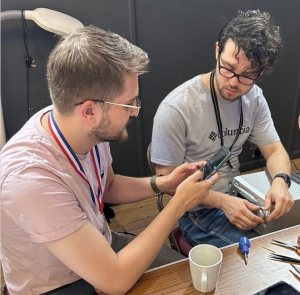
Ollie Janman and Ben Golding, two of our new Repair Café volunteers, hard at work providing a free fix for a community resident.
In both clubs in Godalming, members volunteered to become Club environmental officers, and one, Jenny Mason, to be District 1145’s environmental lead. We put our heads together to find a project to meet these criteria:
- environmentally responsible
- a magnet for new members
- offering significant community benefit, thereby
- raising Rotary’s profile and demonstrating our value to our town, and finally,
- sustainable over the long term.
As we were considering various possibilities, we heard about Repair Cafes and visited a couple nearby which gave us much encouragement. We also made enquiries within Rotary. It seemed that there were no Rotary-led Repair Cafés so far in GB&I, although Rotarians are volunteering in existing cafes organized by others.
In our development phase, between January and June of 2022, we were surprised and delighted by the enthusiasm of everyone we talked to about our plan. Our Town Council, who had already declared a climate emergency and set a target of carbon neutrality by 2030, was very supportive. They offered us grant money (which we did not need). Even better, they also offered us space at no cost to hold our monthly repair events, plus space on the town’s website to promote our activity.
A key characteristic of Repair Cafés is that nobody has to pay the repairers: all the work is done by volunteers donating their expertise. In our café, even the tea/coffee/cake is free: delightful for owners if they are waiting to see an experienced repairer, and also appreciated by repairers while they work.
Of course we do have some costs, but if the event space is made available at no cost, the main expenses are for insurance, publicity, and possibly some essential tools. We were able to launch the project for less than £500, which was covered by a Rotary District grant. Donations will keep us going.
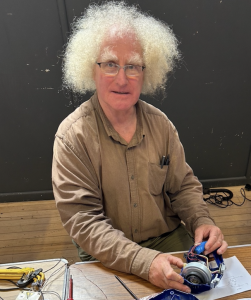
Dave Falconer about to apply technical wizardry.
We were surprised by the speed at which we managed to grow our group of skilled repairers. The huge response to the call for volunteers during the COVID pandemic showed us that many people in the community were willing to give some of their time to a good local cause. We posted on social media that we were intending to open a Repair Café, and people with all kinds of skills offered to share their expertise: electricians, electronics engineers, tailors, furniture restorers, bicycle maintainers, computer specialists, etc. We emphasized there was no commitment, and that the time required – 3 hours or less a month – was minimal. When we opened with the first of two pilot sessions in June 2022, we had about 14 volunteers, of whom 9 were repairers. A year later our team has grown to 40 volunteers.
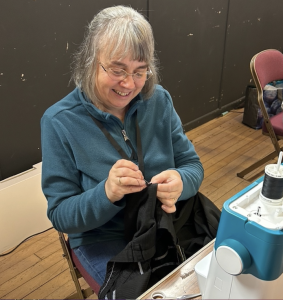
Su McKie mending with a flourish.
A third surprise for us was the speed at which we became known in the community. Our visibility grew due to an article about us in a free magazine delivered to every local residence, the posters we distributed, and, most importantly, by word of mouth. All of our owners comment that this is such a good thing, and there should be such an activity in every town.
The need for this service is reflected in the number of items brought in: we average 32 requested repairs in 2.5 hours a month. We can also see an amazing impact in just a over a year of operation: we’ve diverted half a tonne of materials from landfills and prevented 3.8 tonnes of CO2e greenhouse gas emissions. We have been able to fix or partially fix more than 75% of the items brought in. Three out of four repairs were rated simple.
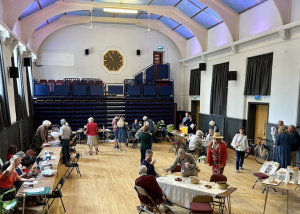
We’re grateful to be able to use this spacious hall for our Repair Cafés.
Was it all plain sailing? Well, not quite. We started in a small room but quickly outgrew that and added another similar-sized but separate room. Operating in two rooms was inefficient and sometimes frustrating for owners and volunteers. Then, three months ago we gained access to a much larger hall of 200 m2 floor space, which suits us well.
The other difficulty, which delayed us in starting, was insurance. The umbrella Rotary coverage arranged by Bartletts in GB&I would not cover this project because of a perceived product liability risk – even though the items being brought in are broken and there is no commercial transaction taking place. We had to arrange separate insurance. We were able to buy local coverage through one of the Rotary clubs in Godalming.
This project brings many benefits in addition to the environmental. Even though the repairs are free, many owners choose to donate, recognising that we have saved them the cost of a replacement item. The repairers get great satisfaction from meeting a challenge and demonstrating their skills, and the interactions between repairers and owners in the repair process helps build social networks and increase our community resilience.
We’re here to help you revive your club with Repair Café!
We are giving talks and offering project templates to other Rotary Clubs to encourage them to start a Repair Café in their town. We have successfully helped start a second café in the small village of Chiddingfold, with a population of 3,000, and are helping other clubs at various stages toward opening their own Repair Café and bringing people to Rotary along the way.
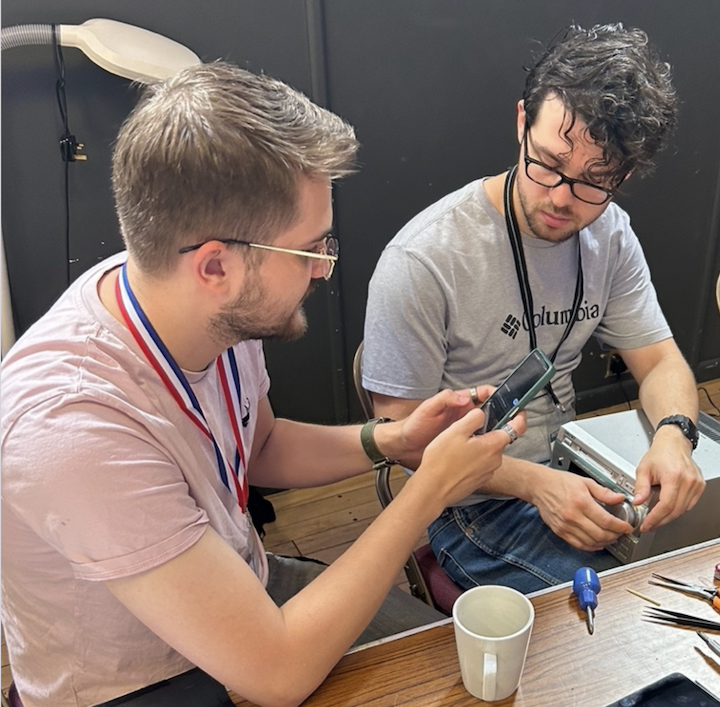
Brilliant, hats off to you!
This is a fantastic project and one that portrays the good work Rotarians are doing worldwide.
It’s environment-friendly benefit is unquantifiable.
I commend other clubs to join this initiative.